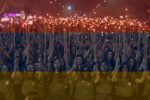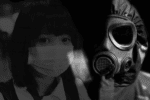| U.S. Independence Day Weekend 2016 has come and gone. Barbeques, beaches, baseball and fireworks, all a not-too-distant memory. Beer. Almost forgot beer. The Boys of Summer are now in full swing, as we move ever-forward having celebrated our Nation’s 240th birthday. 240 years of freedom. “Home of the free, because of the brave” we posted on our social media pages. We reflected on our history, our liberty, our lost comrades-in-arms. Some of us reflected silently. Some of us with family and friends.
After a not-long-enough three-day weekend, our Lima Charlie News Team headed back to work, still reflecting. It was then that we became aware of another celebration of independence—another celebration of freedom, that of a neighbor just to the south. This neighbor, however, has not fared as well, and has not enjoyed the fruits of liberty or abundance that America has.
On July 5th, 35 years and 1 day after America declared its allegiance from the British Crown, Venezuelans avowed “we…are absolved from every submission and dependence on the Throne of Spain.” In 1811, Venezuela became the first South American country to declare independence from Spain.
As America’s Declaration of Independence remains salient in the minds of many, it’s important to also reflect on the circumstances surrounding the independence of our Latin American neighbor. To extend a handshake across the Caribbean and, in doing so, to remind ourselves of how different the trajectories of both countries have been, in securing peace, speech, and liberty for their people, since their fateful day of nationhood.
In the spirit of remembering what these two holidays are really about, let’s first review a brief history of both nations. The independent and autonomous state of Venezuela was created through two initial constitution-making processes. First came the 1811 Declaration of Independence on July 5th of the Spanish colonies that were integrated into the General Captaincy of Venezuela. The second process took place in 1830, after the separation of the provinces of Venezuela from the Republic of Colombia, which had been created nine years prior, by Simon Bolivar.
In the United States, July 4th commemorates the adoption of the Declaration of Independence, in which the Second Continental Congress—speaking for the citizens within the 13 colonies—declared that:
All men are created equal, that they are endowed by their Creator with certain unalienable Rights… among these are Life, Liberty and the pursuit of Happiness … to secure these rights, Governments are instituted among Men, deriving their just powers from the consent of the governed.
The document sealed the fate of the nation by concluding that the United States was, “absolved from all allegiance to the British Crown, and that all political connection between them and the State of Great Britain is, and ought to be, totally dissolved.”
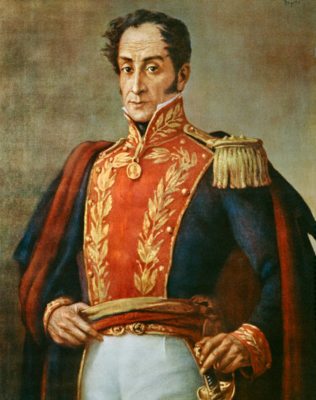 In reminiscing over both countries’ respective “Fathers of Independence,” George Washington is, for most, the more familiar name. Simón Bolivar, however, has earned his position in history as the “Father of Latin American Independence.” Bolivar, The Great Liberator, the “George Washington of South America,” as his sundry eminences regarded him, was a man of Enlightenment—a political and military leader at the helm of his nation—much like General Washington.
In reminiscing over both countries’ respective “Fathers of Independence,” George Washington is, for most, the more familiar name. Simón Bolivar, however, has earned his position in history as the “Father of Latin American Independence.” Bolivar, The Great Liberator, the “George Washington of South America,” as his sundry eminences regarded him, was a man of Enlightenment—a political and military leader at the helm of his nation—much like General Washington.
Both Generals fought revolutions against European monarchs interested in bending the Americas to the will of their hegemony and economic prosperity. In both countries, the Crowns resisted after the declaration. In Venezuela, the fight for self-government continued for more than a decade and, in the United States, a violent 8-year war ensued.
George Washington was a faithful steward to the 18th Century ideal of a “disinterested leader,” one who acts for the greater good above the selfish short-term interest. Bolivar led in the tradition of a king, fusing military and political power. He was a revolutionary who freed six countries, a general who led his own continental army, and an intellectual who fought for national liberation.
For many Spanish Americans, Bolivar was heralded as a dictator, a king. For others, a traitor. He had been president of Colombia, dictator of Peru, president of the newly formed Bolivia, and had a currency—the bolivar—named in honor of his legacy. He is the only person in the world to have two sovereign nations named after him (Bolivia and the Bolivarian Republic of Venezuela).
To some, his greatest political shortcoming was his failure to recognize the rising tides of nationalism, which would culminate into civil wars and bitter divisions of the union he so valiantly fought for. In a desperate attempt to grasp at the fragments of the national situation before him, Bolivar declared himself dictator and his popularity plummeted. The once unassailable Bolivar died bitterly hated by his enemies and outlawed by his own country. Ten days before his death, he declared his last will and testament to his people:
“My enemies have played upon credulity and destroyed what I hold most sacred…my reputation and my love of liberty. I have been the victim of my persecutors, who have brought me to the brink of the grave.”
It would take over a hundred years before democracy reached the shores of Venezuela. After changing hands between dictatorial rulers for more than a century, Venezuela bid farewell to its last de facto ruler, Juan Vicente Gomez, who died in 1935, and in 1947 Romulo Betancourt—heralded as the Father of Venezuelan Democracy—was elected. Betancourt would serve for two elected presidencies. In 1964, Raul Leoni became President during a period known as “puntofijismo” in which elections were limited to competition between two major parties.
In 1998, after leading a failed coup to overthrow the government in 1992, Hugo Chavez—a figure of charisma and political mastery—finally took office, elected to the position on the promise of reducing poverty and corruption. A member of the United Socialist Party, Chavez was the 64th President of Venezuela. With the help of Hugo Chavez, Simón Bolivar’s reputation was restored. Held in the highest esteem, Chavez declared Bolivar an ancestral soul-mate, and the country was renamed in his honor. Chavez would leave an empty chair at all political meetings in honor of the El Libertador.
 Chavez suffered his first electoral defeat in a referendum in 2007. Given the leader’s cult of personality, and with a convincing mandate, he was re-elected in 2012, as the mastermind of the country’s socialist revolution. Addressing the World Social Forum in Porto Alegre, Brazil, Chavez said, “It is impossible, within the framework of the capitalist system to solve the grave problems of poverty of the majority of the world’s population. We must transcend capitalism.”
Chavez suffered his first electoral defeat in a referendum in 2007. Given the leader’s cult of personality, and with a convincing mandate, he was re-elected in 2012, as the mastermind of the country’s socialist revolution. Addressing the World Social Forum in Porto Alegre, Brazil, Chavez said, “It is impossible, within the framework of the capitalist system to solve the grave problems of poverty of the majority of the world’s population. We must transcend capitalism.”
It is impossible, within the framework of the capitalist system to solve the grave problems of poverty of the majority of the world’s population. We must transcend capitalism.
– Hugo Chavez
In 2003, under Chavez’s leadership, the country reached its all-time low in per capita GDP, further fueling food shortage riots and tumultuous economic conditions. In 2013, after undergoing multiple rounds of surgeries, chemotherapy, and radiation, Chavez died of cancer. His successor, the current President, Nicolás Maduro Moros, assumed office in April of 2013, as a member of the United Socialist Party.
Many believe Maduro’s campaign was backed with military might—the power of the state—ensuring he was the “heir to Chavez.” In January of this year, Maduro declared a state of “economic crisis” for 60 days. The country’s economy shrank 7.1% in the third quarter of last year. Venezuela is a nation suffocating under a 275% and rising inflation rate—the highest in the world—on target to reach over 2200% by 2017. As an oil-dependent nation, the current drop in oil prices has forced Venezuela to continue to struggle. To make matters worse, its currency has plummeted. One bolivar is worth .0011 dollars.
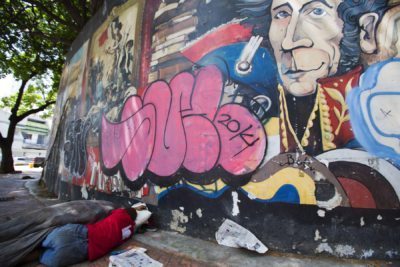 With Venezuela teetering tenuously on the brink of default for the last two months, the government can’t pay to import basic food items, either. Enormous crowds gather in never-ending lines to receive rations of bread, milk, and water—basic staples for their families and children. Crime is rampant, with Caracas estimated to have the highest murder rate of any city in the world.
With Venezuela teetering tenuously on the brink of default for the last two months, the government can’t pay to import basic food items, either. Enormous crowds gather in never-ending lines to receive rations of bread, milk, and water—basic staples for their families and children. Crime is rampant, with Caracas estimated to have the highest murder rate of any city in the world.
At the beginning of May, President Nicolás Maduro declared a national furlough of public employees, instituting a four-day work week to save power. By April, the allowable week had further shrunk to two days. Even time, itself, proved to be no match for the moribund country, as Maduro ordered that all clocks be moved ahead one-half hour to save power. At 2:30 local time on May 1st, the nation shifted its clocks ahead by 30 minutes to four hours behind Greenwich Mean Time. Venezuela’s hydroelectric dams—which provide 70 percent of the country’s electricity—have been reduced to oversized puddles due to a crippling drought.
Faced with starvation and political turmoil, Venezuela has been rocked by fierce riots, particularly in the last two months. At the end of May, word had spread that a delivery of poultry was due at the Central Madeirense Supermarket. Before dawn, as two trucks finally pulled up to the store, the crowd grew violent. Desperation—in the face of extreme food shortages—had turned to anger, then rioting. In one of the nation’s most tumultuous moments, unrest rippled through the city of 200,000, outside the capital of Caracas. This, in addition to protests leveled at Nicolas Maduro, from opposition leaders seeking to cut his term in office short. The country has been shaken by two months of deadly protests, with more than 30 killed since a wave of demonstrations took root against Maduro in early February.
In the midst of economic and social ruin, Maduro has vowed to soldier on with the socialist revolution launched by Chavez in 1999. At the end of June, President Obama called upon the Venezuelan Government to respect the “legitimate efforts” by the nation’s leaders to call a recall referendum against Maduro. Obama issued a critical warning to the Venezuelan leader while at the 2016 North American Leaders Summit, calling the situation “very serious” and stating that Venezuela’s democratic process “should be respected.”
A recent report from the Venezuelan Penal Forum revealed that 1,600 arrests occurred just last month alone for political reasons and that there are “145 formal complaints of torture and cruel and inhumane treatment at the hands of the Bolivarian National Intelligence Service and the National Guard.”
In offering this—a tame window into the much more brutal reality that awaits the Venezuelan people on a daily basis—the Lima Charlie Team encourages its audience to shift their focus outward. As we turn now to what remains of our work week—to the daily hustle and bustle of our lives—as our memories of fireworks soaring from barges and sun burns from beach parties fade—leaving room for new memories of the days ahead, let us remember the magnificent backdrop against which these days will play out.
As we eclipse July 4th and 5th, and all the days to come, let’s remember with profound gratitude and good fortune that, in America, poverty, turmoil, and riots are not the norm. “In America, we don’t fight because we hate what’s in front of us, we fight because we love what’s behind us.” (Pete Hegseth, Army Vet and former Vets for Freedom Director).
Lima Charlie News, with Special Ops by Nikita Roach and Anthony A. LoPresti, and with special thanks to Sherry Hakimi and Jeffrey H. Bloodworth, Truman National Security Project Fellows.
Lima Charlie provides global news, analysis and opinion by military veterans and service members Worldwide.
Please join us on Twitter at @LimaCharlieNews
#LimaCharlie #LimaCharlieNews

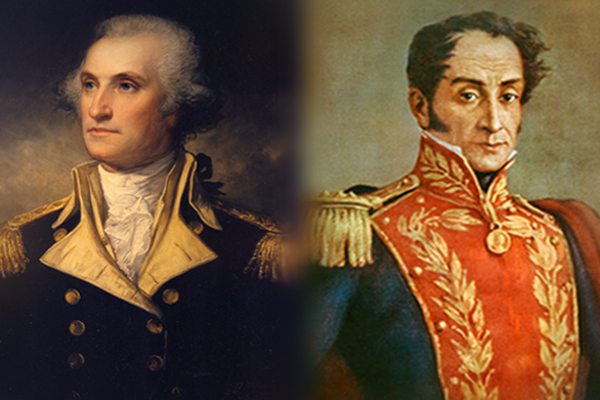
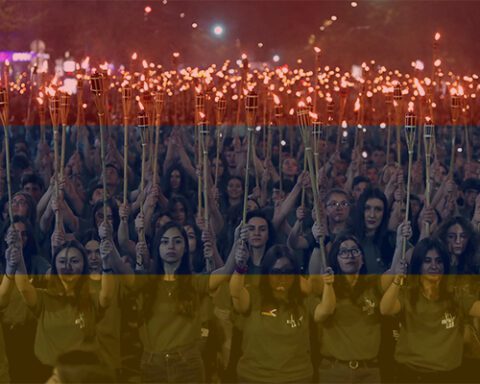

![A Trump war crime pardon dishonors us all [Lima Charlie News]](https://limacharlienews.com/wp-content/uploads/2019/05/A-Trump-war-crime-pardon-dishonors-us-all-Lima-Charlie-News-480x384.png)
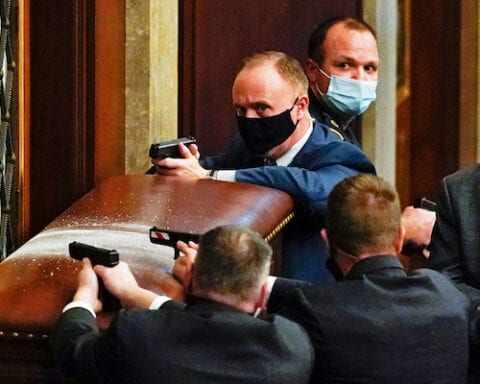

![Image Memorial Day may soon be a remembrance of democracy and those who had the courage to defend it [Lima Charlie News]](https://limacharlienews.com/wp-content/uploads/2018/05/Memorial-Day-may-soon-be-a-remembrance-of-democracy-and-those-who-had-the-courage-to-defend-it-Lima-Charlie-News-480x384.png)
![The Mind of Bolton - AUMF and the New Iran War [Lima Charlie News]](https://limacharlienews.com/wp-content/uploads/2019/05/Inside-the-mind-of-Bolton-Lima-Charlie-News-main-01-480x384.png)
